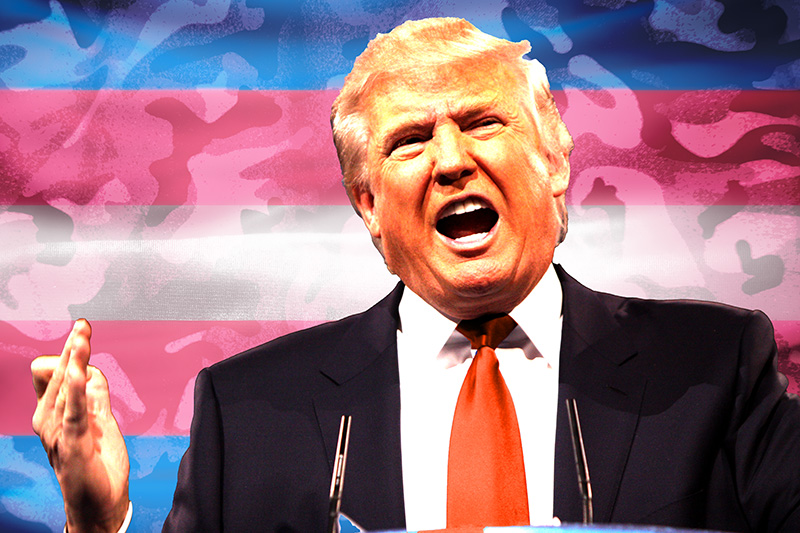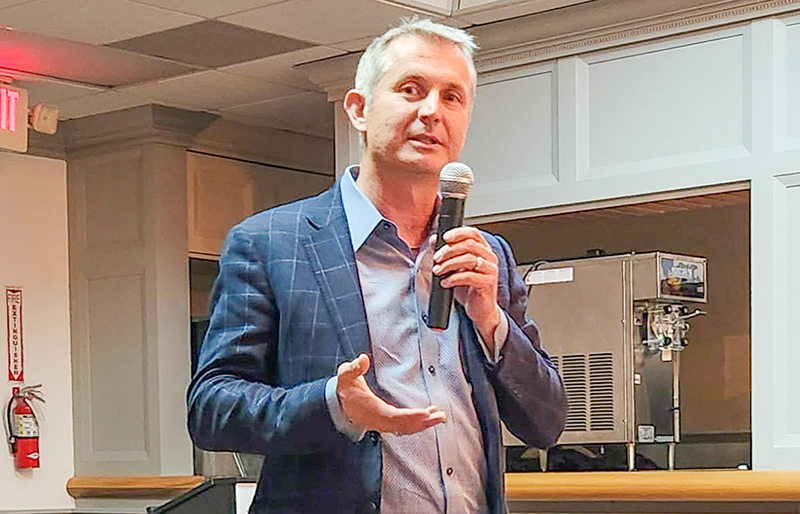Indianapolis Archdiocese’s new policy would ban transgender children from schools
Youth suffering from gender dysphoria must conform to standards based on their biological sex at birth in archdiocese-affiliated schools
By John Riley on June 26, 2020 @JRileyMW

The Roman Catholic Archdiocese of Indianapolis has issued new guidelines warning that transgender students will be prohibited from enrolling in and matriculating at parochial schools in central and southern Indiana that are under the control of the archdiocese.
The new policy is outlined in an eight-page document, “Policy and Complementary Norms on Sexual Identity in School Ministries of the Roman Catholic Church in the Archdiocese of Indianapolis,” which was signed into effect on June 8 by Archbishop Charles Thompson and Schools Chancellor Annette Lentz and distributed to archdiocese employees on June 17.
According to the National Catholic Reporter, the policy draws heavily on a controversial 2019 Vatican document that rejected the concept of transgenderism, saying that people who identify as transgender are “confused” and “annihilate the concept of nature.”
While the policy recommends a “case by case” approach to dealing with questions concerning a student’s sexual identity, it says that students struggling with their sexuality may be admitted to schools, so long as they follow Church teaching, which demands that they commit to celibacy.
However, the policy warns that “any student whose ‘gender’ has been legally changed from their biological sex, or who has chemically and/or surgically altered their given biology, may not be eligible for enrollment.”
The policy distinguishes between those with “chromosomal/genetic abnormalities” and those experiencing “gender dysphoria,” noting that surgeries are available for those who are intersex, but also warns that such surgeries should not be entered into arbitrarily.
Instead, the archdiocese recommends that medical professionals “intervene in the least invasive fashion, on the basis of objective parameters and with a view to establishing the person’s constitutive identity.”
But the bulk of the policy outlines behaviors expected of transgender individuals (though the document does not use the term), or those experiencing gender dysphoria, noting that they cannot take puberty blockers, undergo hormone therapy or surgery.
In school, they will be expected to use pronouns and names that match their biological as determined at birth, dress according to the biological sex, and use facilities, including restrooms and locker rooms, that match their assigned sex at birth.
The policy does state that any type of bullying, harassment, or discrimination “will not be tolerated.”
If a young person is experiencing severe gender dysphoria, the policy advocates that the student, along with their parents, bring the issue to the attention of a pastor and trained professionals “who might best assist them in clarifying and defining issues of self (and sexual) identity in accord with Catholic Church teaching.”
In the June 17 email to archdiocesan officials, the document notes that the policy, which was revised and approved after conferring with the U.S. Conference of Catholic Bishops, is not to be included in faculty or parent/student handbooks, but simply treated as an internal policy.
Related: Trump administration supports Catholic schools firing gay teachers
The policy takes effect almost one year after the Indianapolis Archdiocese attempted to strip Brebeuf Preparatory School of its Catholic affiliation after the school refused to fire a gay teacher who had gotten married to his longtime partner. His partner, who worked at Cathedral High School, was fired, as were two lesbian guidance counselors who worked at Roncalli High School and a straight social worker from Roncalli who objected to her colleagues’ treatment by the school and the archdiocese.
Similar fights are occurring in Catholic-affiliated institutions throughout the country, where the church’s official teachings on sexuality and gender are coming into conflict with a growing societal trend towards acceptance and exposing the human impact that firings and dismissals are having on both teachers and their students.
In February, a bishop in Springfield, Ill., issued a new policy calling for “immediate correction action, suspension, and possible termination” of transgender students and employees. That same month, a Seattle Catholic school was criticized and became the subject of student protests after it was accused of pressuring two openly LGBTQ teachers to resign.
In May, the Archbishop of Dayton was forced to defend his decision not to renew the contract of a popular gay teacher after dozens of current and former students held a socially-distant protest where they blared car horns and played music outside the school in question.
In a statement to ABC affiliate RTV6 Indianapolis, the Archdiocese of Indianapolis defended its new policy, saying it welcomes all students, but tries to balance that welcoming atmosphere with remaining faithful to Catholic Church teachings and incorporating those values and teachings into all aspects of its school culture.
“Some students who attend the Archdiocese’s schools question their sexual identity and we recognize that their struggles have a profound effect on their lives,” the statement reads.
“The Archdiocese’s goal is to always walk in accompaniment with young people and their families. Such accompaniment may result in the provision of resources, accommodations and/or other supports in alignment with Church teaching,” the statement continues. “The hope is that we can continue to serve the student and their family. The safety and welfare of each student is a priority.”

GLAAD, the national LGBTQ media advocacy organization, denounced the archdiocese’s policy, as did Shelly’s Voice, the advocacy group named in honor of one of the fired teachers from Roncalli High.
“The Indianapolis archdiocese’s attempt to target transgender young people rather than create safe and accepting environments for them is shameful and dangerous,” GLAAD President and CEO Sarah Kate Ellis said in a statement.
“Research shows transgender youth face a higher risk of suicide from just this kind of rejection and refusal to see their authentic identity,” Ellis continued. “To codify this rejection further isolates and threatens the very young people in need of love and protection.”
“Shelly’s Voice Advocacy is frightened and dismayed by the new Archdiocesan policy which denies the trans community their dignity and rights,” Shelly’s Voice said in a statement. “This policy advises schools to not allow transgender students to enroll, and advocates for ‘trained’ professionals to help adolescents who are confused about their gender identity by defining ‘issues of self identity’ in accordance with the Catholic teaching.”
Indianapolis PFLAG added its voice to the list of critics of the archdiocese.
“To exclude a group of students from receiving an education because of who they are and how they identify does a terrible disservice to this group of already marginalized youth,” Jan Nichols, president of Indianapolis PFLAG, said in a statement. “The Archdiocese should be lifting these students up, not casting them aside.”
Nichols continued: “As parents and allies of LGBTQ young people, we know all too well the difficulties that transgender students often face. Indianapolis PFLAG will do all we can to help these students and their families receive the quality education they deserve.”
Read more:
WATCH: President Obama’s message to the LGBTQ community for Pride Live
WATCH: Trump advisor says anti-LGBTQ people upset over SCOTUS rulings should re-elect Trump
Trump Viciously Attacks Trans Community in Congress Speech
President Trump called transgender identity a "big lie" and flaunted his orders restricting trans health care and sports participation.
By John Riley on March 5, 2025 @JRileyMW
President Donald Trump used his address to Congress on Tuesday, March 4, to attack transgender individuals, calling transgender identity a "lie" and railing against transgender athletes, gender-affirming care, and trans visibility in the military and more broadly within society.
At one point during the speech, Trump switched from speaking about a child who was diagnosed with cancer to claim his administration was protecting children from "toxic ideologies" in schools.
He brought up the story of January Littlejohn, a Florida anti-transgender activist who sued the Leon County School District in Tallahassee, Flordia, in 2021, alleging that her child's school had discussed restrooms and name change requests with the child, assisting her in "socially transitioning" without informing Littlejohn or her husband of their efforts.
Trans Woman Arrested For Using Women’s Bathroom to Wash Hands
A transgender protester is facing jail for entering a women's bathroom to wash her hands at the Florida State Capitol.
By John Riley on April 3, 2025 @JRileyMW
A transgender protester from Illinois was arrested for washing her hands in the women's bathroom at the Florida State Capitol.
But it wasn't because she was outed or reported to the police by another person.
Rather, she outed herself.
According to the Miami Herald, 20-year-old college student Marcy Rheintgen alerted Florida lawmakers of her intention to use the women's restroom in protest of the state's 2023 transgender bathroom ban, which prohibits transgender individuals from using bathrooms matching their gender identity in public buildings, universities, schools, public parks, or correctional institutions.
Texas Bill Would Make Identifying as Transgender a Crime
A proposed law in Texas could jail trans individuals who attempt to be recognized by their gender identity under the provision of "fraud."
By John Riley on March 10, 2025 @JRileyMW
A newly introduced Republican bill in Texas seeks to criminalize anyone who identifies as transgender.
Introduced by State Rep. Tom Oliverson (R-Cypress), the bill would amend the Texas Penal Code to create a new form of fraud known as "gender identity fraud."
Under the bill, if a person makes a "false or misleading verbal or written statement" to a government entity or a private employer asserting that their gender is the opposite of the biological sex assigned to the person at birth, that person could be charged with a felony, could serve up to two years in prison, and be fined $10,000.
Support Metro Weekly’s Journalism
These are challenging times for news organizations. And yet it’s crucial we stay active and provide vital resources and information to both our local readers and the world. So won’t you please take a moment and consider supporting Metro Weekly with a membership? For as little as $5 a month, you can help ensure Metro Weekly magazine and MetroWeekly.com remain free, viable resources as we provide the best, most diverse, culturally-resonant LGBTQ coverage in both the D.C. region and around the world. Memberships come with exclusive perks and discounts, your own personal digital delivery of each week’s magazine (and an archive), access to our Member's Lounge when it launches this fall, and exclusive members-only items like Metro Weekly Membership Mugs and Tote Bags! Check out all our membership levels here and please join us today!
The Magazine
-
Most Popular
 Signature Honors Mandy Patinkin in Emotional Celebration
Signature Honors Mandy Patinkin in Emotional Celebration  Gay Army Reserve Officer in Uniform Sex Video Scandal
Gay Army Reserve Officer in Uniform Sex Video Scandal  A Potent (and Pricey) 'Good Night, And Good Luck'
A Potent (and Pricey) 'Good Night, And Good Luck'  MISTR's Free DoxyPEP Leads to Huge Drop in STI Rates
MISTR's Free DoxyPEP Leads to Huge Drop in STI Rates  'Gray Pride' Protests Hungary's Ban on Gay Pride Marches
'Gray Pride' Protests Hungary's Ban on Gay Pride Marches  Becca Balint: The Pride of Vermont
Becca Balint: The Pride of Vermont  Police Barge into Walmart Restroom to Confront Butch Lesbian
Police Barge into Walmart Restroom to Confront Butch Lesbian  Jared Polis Signs Law Repealing Colorado's Gay Marriage Ban
Jared Polis Signs Law Repealing Colorado's Gay Marriage Ban  Sarah Snook is Astonishing in Broadway's 'Dorian Gray'
Sarah Snook is Astonishing in Broadway's 'Dorian Gray'  Sniffies CMO Eli Martin On Cruising Into the App Store
Sniffies CMO Eli Martin On Cruising Into the App Store
 Becca Balint: The Pride of Vermont
Becca Balint: The Pride of Vermont  Signature Honors Mandy Patinkin in Emotional Celebration
Signature Honors Mandy Patinkin in Emotional Celebration  MISTR's Free DoxyPEP Leads to Huge Drop in STI Rates
MISTR's Free DoxyPEP Leads to Huge Drop in STI Rates  A Potent (and Pricey) 'Good Night, And Good Luck'
A Potent (and Pricey) 'Good Night, And Good Luck'  Sarah Snook is Astonishing in Broadway's 'Dorian Gray'
Sarah Snook is Astonishing in Broadway's 'Dorian Gray'  'Gray Pride' Protests Hungary's Ban on Gay Pride Marches
'Gray Pride' Protests Hungary's Ban on Gay Pride Marches  Jared Polis Signs Law Repealing Colorado's Gay Marriage Ban
Jared Polis Signs Law Repealing Colorado's Gay Marriage Ban  White House Ignores Reporters with Pronouns in Email Signatures
White House Ignores Reporters with Pronouns in Email Signatures  White House Demands NIH Study Transgender Transition "Regret"
White House Demands NIH Study Transgender Transition "Regret"  Air Force Reverses Ban on Pronouns in Email Signatures
Air Force Reverses Ban on Pronouns in Email Signatures
Scene
Metro Weekly
Washington's LGBTQ Magazine
P.O. Box 11559
Washington, DC 20008 (202) 638-6830
About Us pageFollow Us:
· Facebook
· Twitter
· Flipboard
· YouTube
· Instagram
· RSS News | RSS SceneArchives
Copyright ©2024 Jansi LLC.











You must be logged in to post a comment.